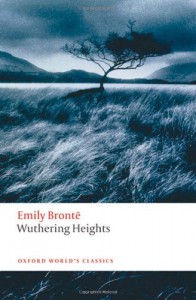Eccentric Musings (jakaEM)
"I have undergone sharp discipline which has taught me wisdom; and then, I have read more than you would fancy." Emily Brontë
still figuring this place out - Jen W
Currently reading


A Brontë Brain on a Page

This novel is such an accomplishment. Emily Brontë, you ROCK.
I say this, even though page for page, my heart and soul belongs with Charlotte – and specifically, with Jane Eyre and Villette. It’s just more of a match for me and who I am.
Yet I admire and am astounded by Emily’s talent. That admiration comes from now knowing the broader context of her life. I certainly didn’t feel it the first time through WH – when I dismissed the achievement because of the over-the-top plotting and characterization. It just seemed so far-fetched way back when; just not my thing.
Yet on re-reading, I was unable to distance myself from the characters, as extreme as they are. I don’t see them, now, as unrealistic - in fact, they were all too real. I felt a powerful revulsion for them and especially, for the child abuse. Meaning, I felt both repulsed by their bad behaviour and also sympathetic for the abuse they experienced that made that behaviour all the more likely, and all the more tragic.
I literally had spasms of anger course through me towards the end. On many occasions, I contemplated whether to stop reading - I found it so painful.
There's a nature/nurture theme here that I don't think Emily got quite right. She did not differentiate well enough the different nature/nurture scenarios and their effects on character. Basically, all the nasty pieces of work were nasty in the same ways, despite various combinations of inborn temperament and parenting/environment.
But even to tackle it (a woman who had about three years of formal schooling and had travelled just barely more than the younger Cathy had by age 13) is such an impressive feat.
And even if you peel away that (unnecessary?) thematic layer, the drama of the story and characters stand. The miracle of a woman like Emily Brontë creating this thing that is 100% a product of her own imagination stands.
As she herself says, through her housekeeper/storyteller (and how clever is THAT!):
“I certainly esteem myself a steady, reasonable kind of body … not exactly from living among the hills, and seeing one set of faces, and one series of actions, from year's end to year's end: but I have undergone sharp discipline which has taught me wisdom; and then, I have read more than you would fancy …”.
Virginia Woolf, in A Room Of Ones Own, questioned why the Brontës – and Eliot and Austen, too – wrote novels. Why the novel? She saw Emily, had she lived or lived in different times, as a dramatic playwright: as potentially transcendent as Shakespeare.
So do I.
I am still beyond pissed at Charlotte for destroying Emily’s second novel after her death. (I love you, Charlotte; it’s your behaviour I dislike). And (or so), I haven’t yet read her forward to the second edition of WH published after Emily’s death, included in my Oxford World Classics copy, along with a selection of Emily’s poems and some reasonably competent end notes.
Juliet Barker’s assumption is that Charlotte ultimately deemed Emily’s second novel inappropriate for what novels should be – which, Charlotte believed, was what would be marketable and what would preserve and protect the integrity and reputation of the sisters.
But Emily didn’t give a fig about what the neighbours – or the public at large – thought.
She had access to the richest, most colourful, most interesting, most stimulating world close at hand, not within or close by the four walls of the Haworth Parsonage, but within her own imagination. Nothing else was relevant to her.
She didn’t need the society of others (but for her siblings and her beloved dog, Keeper); she didn’t need instruction or exposure to ideas beyond the large library she had at hand. She had an ever-expanding world within her own brain, with none of the limits imposed by mid-19th century Yorkshire or what anyone thought of her or her writing.
Wuthering Heights is a matured version of the juvenilia – specifically, the Gondal world where Emily’s imagination, her life and her soul, lived. Enter it with her: whether you like that world or not; whether you are drawn to it or want to revisit it; whether you respond to its characters or its themes is irrelevant, she will make you feel it .
Wuthering Heights is Emily’s brain on a page. She didn’t create a world and send it out to the reader through the mundane conduit of publication, as much as she opened a door to her soul and invited the reader in.
That said, she did write and publish it, pouring out her thoughts – strange and dark and disconnected (but not really) from the outside world; an alternate universe, but a universal and lasting legacy in a novel – her only one – and one that remains in print and among the very best of a century of best novels.
Transcendent. Shakespearean. Emily Brontë.
Believe it.



 5
5
 2
2